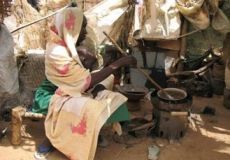US Berkeley scientists work scrap metal for Darfur
August 8, 2007 (BERKELEY, California) — In the last 70 years, researchers at Lawrence Berkeley National Laboratory in California have smashed molecules, analyzed cosmic rays and used supercomputers to simulate the earth’s climate.
 Now, scientists there have created a device that, though it can be built out of scrap metal, has the potential to alleviate suffering for some of the 2.2 million displaced people in Sudan’s troubled Darfur region.
Now, scientists there have created a device that, though it can be built out of scrap metal, has the potential to alleviate suffering for some of the 2.2 million displaced people in Sudan’s troubled Darfur region.
The device is a wood-fired stove, meant to replace the traditional campfire over which the refugees — mostly women and children — typically boil water and cook powdered grain into bread.
These fires are so inefficient that for many refugees, each day has meant a new struggle to find, or buy, enough wood to survive.
That’s where Dr. Ashok Gadgil comes in.
The Indian-born physicist told Reuters that once he learned about the refugees’ plight, he was gripped by a vision of a more efficient stove that could reduce the number of exhausting wood-seeking journeys on which women are vulnerable to attack.
“How can you not work to solve a problem when you have a solution in your back pocket, and you see somebody is under abysmally harsh conditions, suffering agony?” he said.
Three years and countless prototypes later, Gadgil and a small group of volunteers have given birth to an angular, oddly shaped contraption that wouldn’t look out of place in a junkyard.
Still, the thermal physics behind the stove seem impressive: the group says the device is nearly four times more efficient than a traditional “three-stone” fire.
Fuel consumption isn’t generally considered a life-or-death matter, but Gadgil said his experience in the camps told a different story.
Some women, he recalled, were initially hesitant to cook using the unfamiliar gadget. But with time, they confided that “every night we move it to near our bed, because this is our most prized possession.”
Ken Chow, a Berkeley colleague recruited by Gadgil to fine-tune the design, transformed the prototype so it could be manufactured using locally available tools and, if necessary, without electricity.
The soft-spoken mechanical engineer emphasized that if the project is successful, it will be because of key features that grew out of “user feedback” in Darfur itself.
Chow explained that the stove’s shape and size are based upon specific types of cooking pots commonly used by refugees; it also accommodates the “higher heat needed for the onions that they cook, and for the windy conditions.”
With the design locked in, Gadgil and his team have partnered with CHF International, a Maryland-based nonprofit group, to begin setting up workshops in Darfur where craftsmen will one day be able to produce thousands of units per week.
What is less clear is how the impoverished refugees, who live on less than a $1 per day, will pay for the Berkeley stove.
Gadgil is determined not to subsidize the purchase price using foreign aid. That would reduce the actual price of the stove, but profiteers along the way might to sell it for scrap and make more money.
Instead, he hopes to organize a micro-financing scheme, in which the stoves would be rented to refugee families at a price they could afford.
(Reuters)
